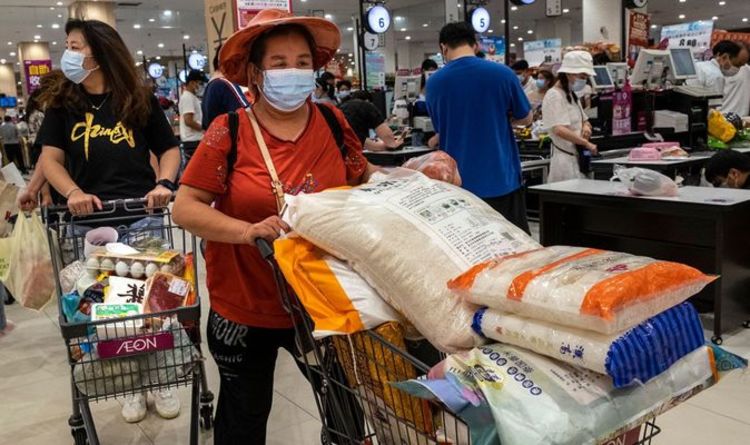

Cindy Yu, when questioning how tension over the island of Taiwan is escalating into a potential conflict situation, said: “In China, my family and friends have been given the advice to start stockpiling.” Speaking of the worrying request, she added: “I don’t know how much of that is local government or officials taking their job too zealously… but there are memos going out right now saying you might want to start thinking about stockpiling for war.”
Speaking to David Runciman on his _Talking Politics _podcast, she added: “The reaction from people that I know in China are just saying let’s think about tinned foods, and this sort of stuff, if we take Taiwan and the Americans retaliate, and they pursue supply chains, what could happen to us, ordinary people.”
On the potential that a conflict could erupt between the US and China, the commentator said: “The wheels are in motion, and I don’t know how it’s going to turn out.”
Yet it seems that the situation now seen over Taiwan between the US and China is nothing new in the political arena.
READ MORE:
Covid mystery solved? Patient zero pinpointed by scientist
The whole notion of two superpowers tussling over an issue bears credible references to a Cold War scenario.
Similar traits were seen in the Sixties through to the collapse of the Iron Curtain in the early Nineties between the USA and the Soviet Union.
As new superpowers emerge, and the world slowly but surely moves into a more multi-polar world order, the notion of the security dilemma once again raises its head.
With the Taiwan situation so far nothing more than a war of words, and a demonstration of force, all indications point towards the status quo being maintained over the island.
In the unlikely events that a conflict breaks out, the wider consequences will be extremely worrying.
With both China and the US enjoying permanent seats on the United Nations Security Council, a stalemate position will incur over any notion of international intervention.
Regional state actors will be sucked into the conflict, with nuclear powers such as North Korea and Russia on the fringes of a regional war.
Add to this the ever-increasing presence of western powers in the region, as global focus shifts east, the potential for a more global impact becomes more of a reality.
DON’T MISS:
United Ireland fears – UK oblivious to rise of Sinn Fein [REVEAL]]
Euro to launch new cryptocurrency [REPORT]
How China is planning to block US army base signals [INSIGHT]
Although the US has vocally admitted that it is bound to protect the rights of Taiwan, it fails to outright recognise the island nation as a sovereign state and openly backs the notion of the One China policy.
More broadly, China and the US have recently demonstrated that diplomacy remains on the table.
Two such examples saw President Joe Biden and President Xi Jinping meet in a virtual conference, in which Mr Xi labelled the US Commander in Chief as “my old friend”.
Another example saw the two economic superpowers come to an agreement over a joint environmental plan designed to tackle rising climate change following the dust settling at the COP26 agreement in Glasgow.
Although President Xi has threatened to take Taiwan “by force if necessary,”, this is widely seen as the Premier appeasing his population at home rather than an actual threat.





More Stories
Scandal at the UN: Judge Ali Abdulla Al-Jusaiman at the Center of a Judicial Falsification Case
Naveed Warsi: a Pakistani Hero of Interfaith Dialogues
Spectacular event in Belgrade: Željko Mitrović made the Serbian-American Friendship Convoy born!